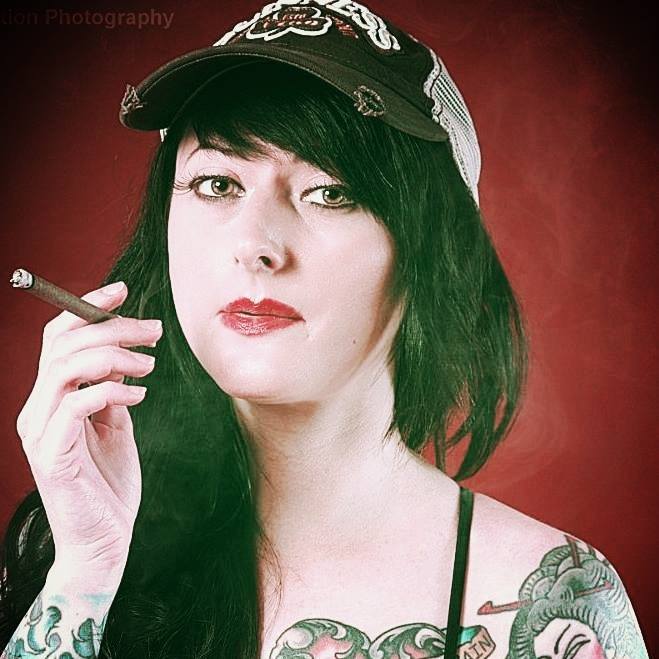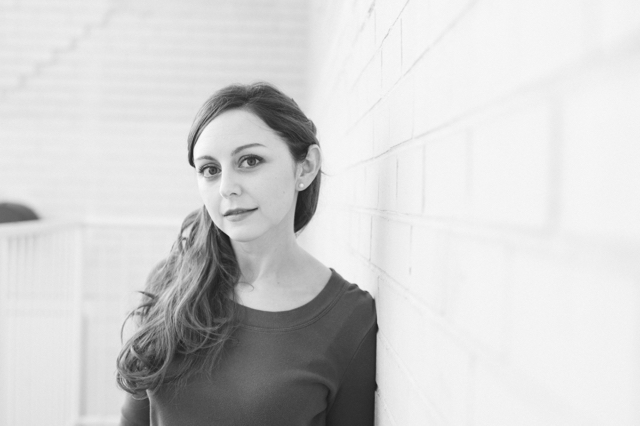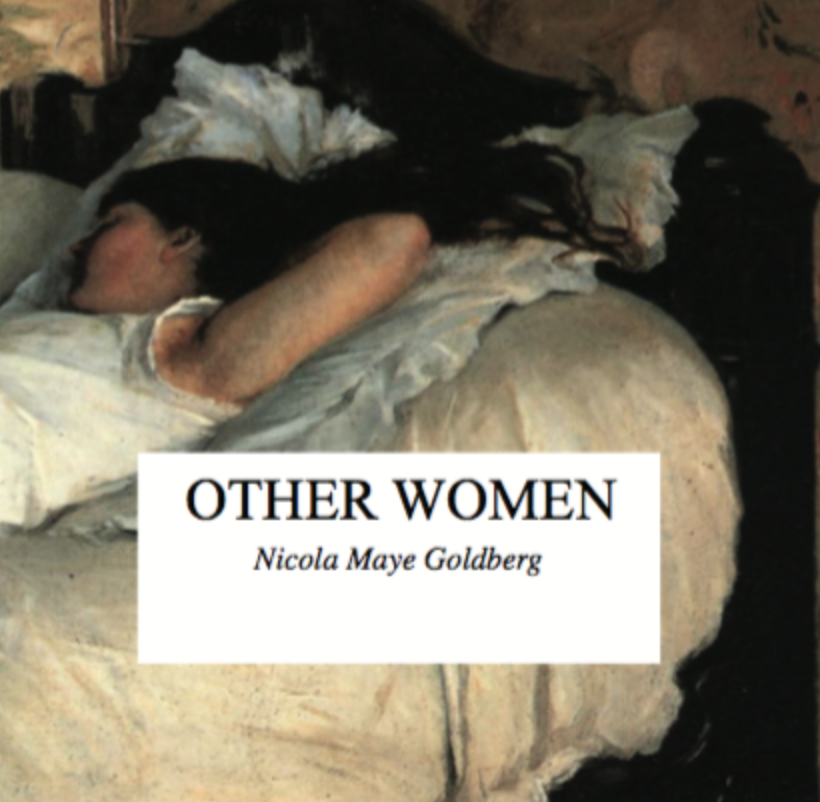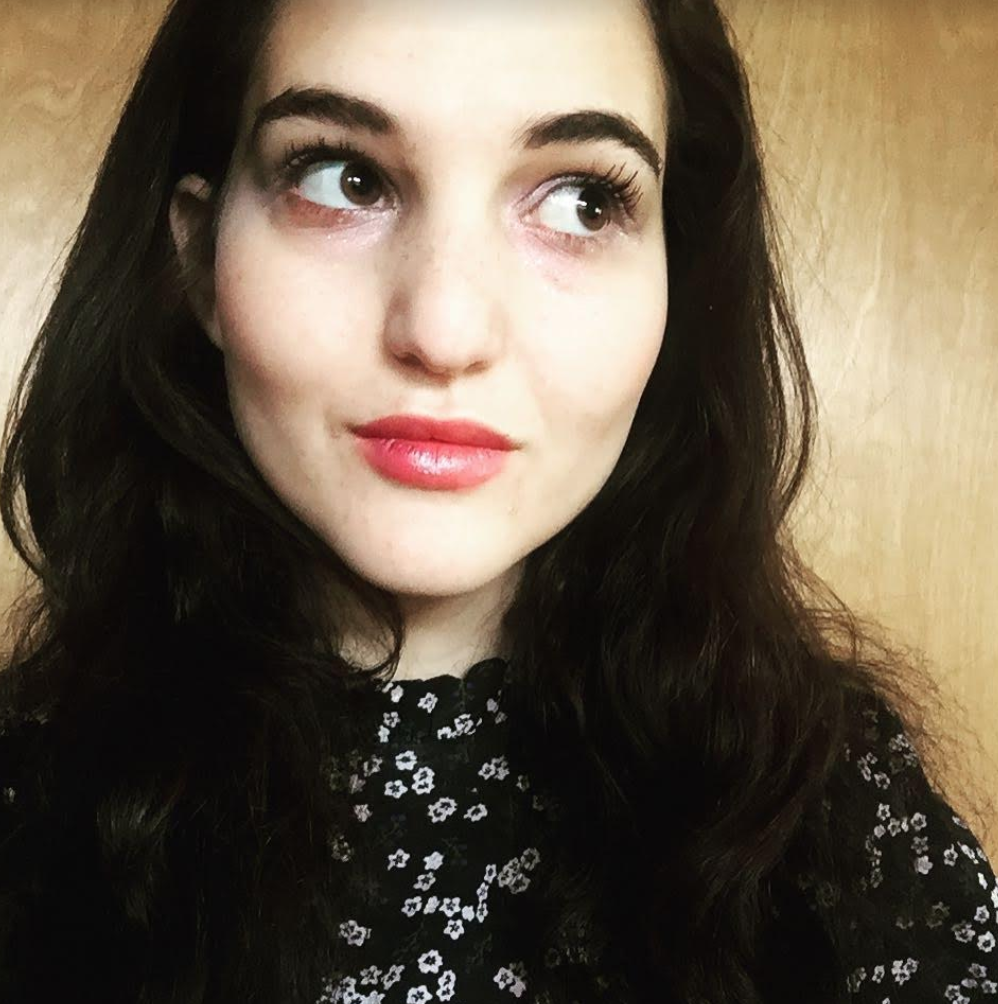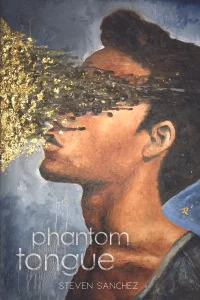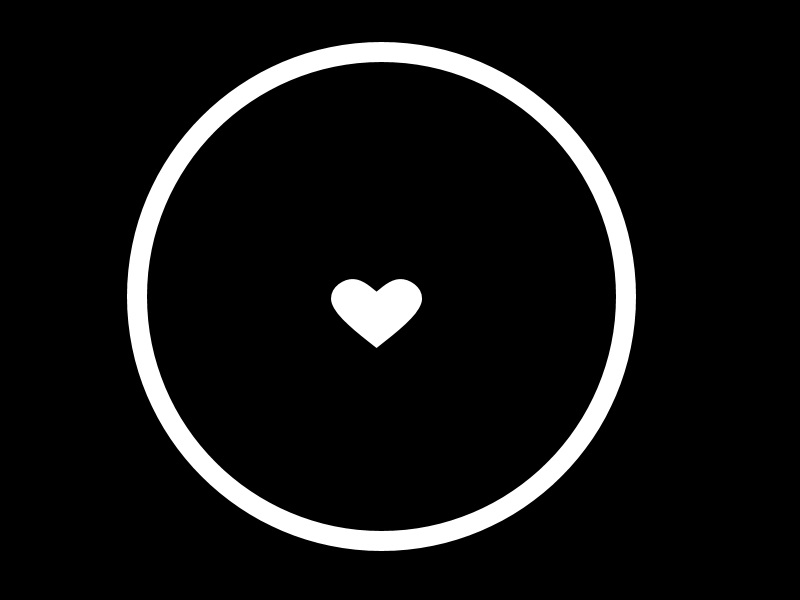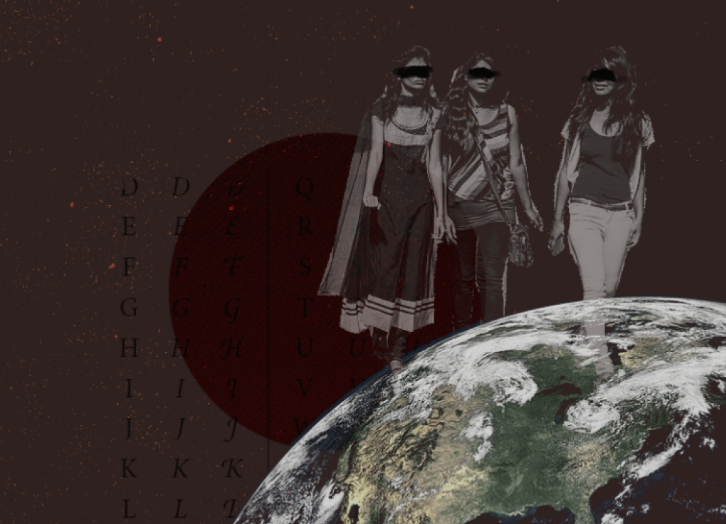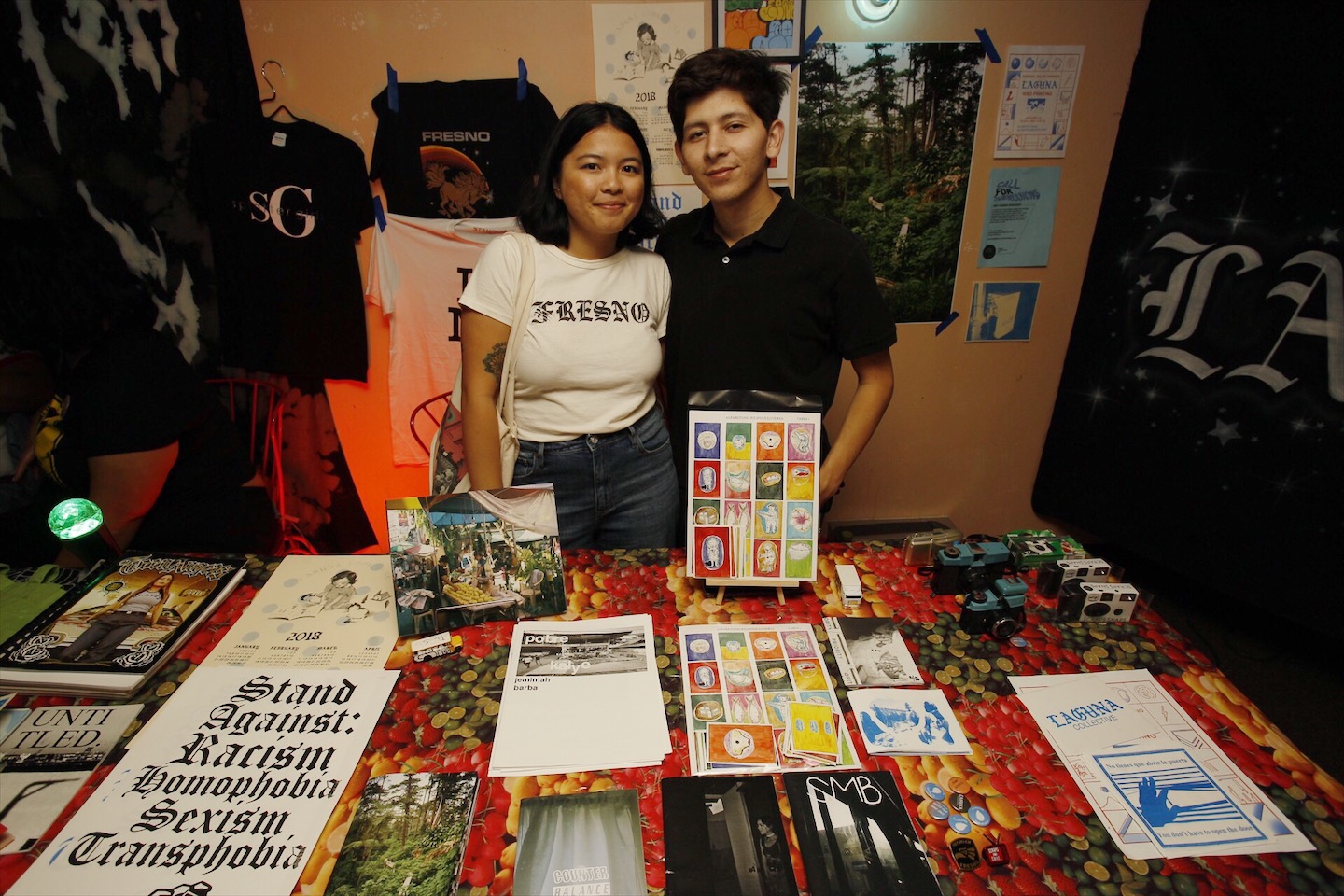Brandon Amico is a writer whose debut collection of poems, DISAPPEARING, INC., is forthcoming in March 2019 from Gold Wake Press.
Read MoreJune Gehringer Tells Us What She's Afraid Of
Born and raised in Omaha, NE, JUNE GEHRINGER is a mixed Chinese trans woman who is somehow still alive. She is the author of I Don’t Write About Race (2018, CCM), I love you it looks like rain (Be About It 2017), and EVERYONE IS A BIG BUG TO SOMEONE (self-published) 2017. She is the co-founder of tenderness yea, and tweets @unlovablehottie. She holds a B.A. in English from Loyola University New Orleans and has worked as a cook since she was 16.
Joanna C. Valente is a human who lives in Brooklyn, New York. They are the author of Sirs & Madams, The Gods Are Dead, Marys of the Sea, Sexting Ghosts, Xenos, No(body) (forthcoming, Madhouse Press, 2019), and is the editor of A Shadow Map: Writing by Survivors of Sexual Assault. They received their MFA in writing at Sarah Lawrence College. Joanna is the founder of Yes Poetry and the senior managing editor for Luna Luna Magazine. Some of their writing has appeared in The Rumpus, Them, Brooklyn Magazine, BUST, and elsewhere. Joanna also leads workshops at Brooklyn Poets. joannavalente.com / Twitter: @joannasaid / IG: joannacvalente / FB: joannacvalente
Hillary Leftwich on Happiness & Why It's Important to Love Childhood Films
Hillary Leftwich is the author of the forthcoming collection Ghosts Are Just Strangers Who Know How To Knock from Civil Coping Mechanisms (CCM) Press in 2019. She earned her MFA in fiction and poetry from the Mile High MFA at Regis University. She is the poetry and prose editor for Heavy Feather Review and curator/host for At the Inkwell Denver, a monthly reading series. In her day jobs she has worked as a private investigator, maid, repo agent, and pinup model. Currently, she freelances as a writer, editor, writing workshop instructor, and guest instructor for Kathy Fish’s Fast Flash Workshop. Her writing can be found or is forthcoming in print and online in such journals as Entropy, The Missouri Review, The Review Review, Hobart, SmokeLong Quarterly, Matter Press, Literary Orphans, Sundog Lit, NANO Fiction, Occulum, Jellyfish Review, and others.
Read MoreJordan Rothacker On the Apocalypse, Jared Kushner, and Daily Rituals
Joanna C. Valente is a human who lives in Brooklyn, New York. They are the author of Sirs & Madams, The Gods Are Dead, Marys of the Sea, Sexting Ghosts, Xenos, No(body) (forthcoming, Madhouse Press, 2019), and is the editor of A Shadow Map: Writing by Survivors of Sexual Assault. They received their MFA in writing at Sarah Lawrence College. Joanna is the founder of Yes Poetry and the senior managing editor for Luna Luna Magazine. Some of their writing has appeared in The Rumpus, Them, Brooklyn Magazine, BUST, and elsewhere. Joanna also leads workshops at Brooklyn Poets. joannavalente.com / Twitter: @joannasaid / IG: joannacvalente / FB: joannacvalente
Jordan Rothacker is a writer living in Athens. His most recent novel is My Shadow Book by Maawaam, available at readspaceboy.com.
photo: Anna Carson Dewitt
Kate Horowitz On Why Saying No More Often Is Important
Joanna C. Valente is a human who lives in Brooklyn, New York. They are the author of Sirs & Madams, The Gods Are Dead, Marys of the Sea, Sexting Ghosts, Xenos, No(body) (forthcoming, Madhouse Press, 2019), and is the editor of A Shadow Map: Writing by Survivors of Sexual Assault. They received their MFA in writing at Sarah Lawrence College. Joanna is the founder of Yes Poetry and the senior managing editor for Luna Luna Magazine. Some of their writing has appeared in The Rumpus, Them, Brooklyn Magazine, BUST, and elsewhere. Joanna also leads workshops at Brooklyn Poets. joannavalente.com / Twitter: @joannasaid / IG: joannacvalente / FB: joannacvalente
Kate Horowitz is an essayist, poet, and science writer in Washington, D.C. She is also a chronically ill and disabled lady; an enthusiastic, if clumsy, dancer; a cross-stitcher; and a fan of dogs and toddlers. She likes the moon, and moss, and rain, and bedtime snacks, and long walks at night.
An Interview With Nicola Maye Goldberg
BY LISA MARIE BASILE
OTHER WOMEN is a novel by Nicola Maye Goldberg.
About the book: After dropping out of college, a young woman wanders through New York both invisible and vulnerable, studying the city’s strong magic and longing for a man she knows will never love her back. She thinks she finds salvation when Charlotte Herzfeld, the young wife of a successful businessman, hires her as a live-in nanny to accompany the family on their trip to Berlin. As the After dropping out of college, a young woman wanders through New York both invisible and vulnerable, studying the city’s strong magic and longing for a man she knows will never love her back. She thinks she finds salvation when Charlotte Herzfeld, the young wife of a successful businessman, hires her as a live-in nanny to accompany the family on their trip to Berlin. As the Herzfelds begin to crack under the weight of their secrets, she finds herself in a more precarious position than ever before. Both thoughtful and restrained, Goldberg’s prose examines the painful obsession that so often accompanies the confusing lust of youth. Herzfelds begin to crack under the weight of their secrets, she finds herself in a more precarious position than ever before. Both thoughtful and restrained, Goldberg’s prose examines the painful obsession that so often accompanies the confusing lust of youth.
In your book, OTHER WOMEN, love how sometimes your writing feels like a diary, a memory, and a peek behind the curtains at once. I love passages like this, where you detail so beautifully, so gently, and so specifically on a situation.
"Obviously we don’t get to choose who we love, I thought. I was lying in an unmade bed that smelled of gin and soap and your girlfriend’s perfume. All things considered, you can do much worse than a wall. 25 We stayed up until dawn. I watched the shadows of your eyelashes move rapidly across your cheeks. We got under the covers and you pulled me close to you, muttering something about goose-bumps. I tried to sleep beside you, but your heart beat so fast it bothered me. You couldn’t believe how small I was, how cold."
What inspired this book, and your style of writing? What inspired this narrator?
The starting point for the book was the same, I imagine, as for a lot of books - I was really in love with someone who didn't give a shit about me. The bulk of the book is made up of emails I wrote and never sent to that person. A lot of the book was also written in the margins of the notebooks when I should have been taking notes in class, or in the notes app on my phone.
Do you read while you write, or do you avoid writing so as not to become a sponge? I myself feel like I can't read while writing, or else something happens and bits of something kind of get stuck in my mind and I feel like what comes out isn't clearly me. That's probably why I write so slowly. Tell me about how muse and inspiration intersect with your writing process.
I'm almost always writing - though not necessarily well - so it would be impossible to not read while I'm writing. I read a lot of poetry while I was writing Other Women. I was especially obsessed with Couer de Lion by Ariana Reines. Fiction is my favorite thing to read, but I try to balance it out with nonfiction and poetry as much as I can, because I'm afraid of other writer's voices overpowering my own. I often write while watching television, which is not very disciplined of me, but seems to work.
Your book is very firmly rooted in the experience of being a young woman. Tell me more about the appeal of writing about that experience, that condition, that perspective. Why do you think these tales, and that voice, is so fucking intoxicating?
I mean, it's what I know. In the project I'm working on now, I throw my voice a lot more, writing through the perspective of people who are very different from myself. But for my first book, it seemed safer, I guess, to stay close to my own experience and perspective. I don't know what makes it appeal to other people. Personally I've kind of lost my appetite for coming of age novels right now! Personally I'm really into books about older women who have been through a lot and have unusual views on the world.
If your book was a song or a color, which song, and which color, would it be? Why?
If it were a song it would definitely be "I don't smoke" by Mitski which I listened to a ton while writing. That song is very much in the emotional register I tried to maintain in the book. And a color - maybe a pale pink with blue undertones. Or maybe lilac? Something muted, probably.
Who should read your book? Who is Other Women for?
I wrote it primarily for myself, I think. I tried to write a book I wanted to read. I have no idea who should read it. I will say that I am a little surprised whenever men tell me they enjoyed the book.
There's a little conversation in the book about the narrator saying to her lover that she liked soft sweaters; he responds by saying he prefers material sturdy, strong. Something that will last unto death. You write, "It was such a small, odd piece of information you’d given me, but there was a real possibility that it was something only I knew. Even though I knew you most likely forgot that conversation by the time you left my apartment, to me it was a real gift."
These tiny snapshots, fragments—they stay with us, and you manage to capture them so tenderly and honestly throughout your whole book. I love that. Do you think that love is a perpetual struggle in being seen, remembered, being seen as special? Is this more a book of sorrow, or is it more a book of acceptance and growth?
Thank you for the compliment! I think I know even less about love now than I did when I started the book. There's pretty much nothing about it I can say with any certainty. As to that particular conversation: I thought if I captured certain moments, certain memories, I would be able to drain them of their power, that they would no longer have such a hold on me. It didn't work.
I love the fact that you published with Witch Craft Magazine. What drew you to that press, specifically? It's such a perfect combination of editor/writer magic.
Other Women was originally my undergraduate thesis. After I finished writing it I sent it to some agents who basically said it was too short to be published and that I should make it longer, which I really didn't want to do. Witch Craft published one of my short stories around the same time, so I asked Elle if she knew of any small presses that might be interested in my manuscript. I actually don't remember if it was Elle or I who suggested that they publish it. I'm really glad it worked out the way it did. Elle and Catch have been such a joy to work with. I got to have a lot of creative control, which I appreciate.
Can you tell me what else you're working on right now?
I'm working on a book about murder, inspired by a ghost story I heard while I was in college. I'm sort of nervous to say too much about it, like that might jinx it or something. Spending so much time thinking about ghosts has apparently made me superstitious.
Nicola Maye Goldberg is the author of Other Women (Sad Spell Press, 2016) and The Doll Factory (Dancing Girl Press, 2017). She is a graduate of the fiction program at Columbia University. She lives in New York City.
Other Women: An Excerpt by Nicola Maye Goldberg
BY LISA MARIE BASILE
OTHER WOMEN is a novel by Nicola Maye Goldberg. You can read an interview with her here.
About the book: After dropping out of college, a young woman wanders through New York both invisible and vulnerable, studying the city’s strong magic and longing for a man she knows will never love her back. She thinks she finds salvation when Charlotte Herzfeld, the young wife of a successful businessman, hires her as a live-in nanny to accompany the family on their trip to Berlin. As the After dropping out of college, a young woman wanders through New York both invisible and vulnerable, studying the city’s strong magic and longing for a man she knows will never love her back. She thinks she finds salvation when Charlotte Herzfeld, the young wife of a successful businessman, hires her as a live-in nanny to accompany the family on their trip to Berlin. As the Herzfelds begin to crack under the weight of their secrets, she finds herself in a more precarious position than ever before. Both thoughtful and restrained, Goldberg’s prose examines the painful obsession that so often accompanies the confusing lust of youth. Herzfelds begin to crack under the weight of their secrets, she finds herself in a more precarious position than ever before. Both thoughtful and restrained, Goldberg’s prose examines the painful obsession that so often accompanies the confusing lust of youth.
We stayed up until dawn. I watched the shadows of your eyelashes move rapidly across your cheeks. We got under the covers and you pulled me close to you, muttering something about goose-bumps. I tried to sleep beside you, but your heart beat so fast it bothered me. You couldn’t believe how small I was, how cold.
In the morning you smoked a cigarette, pretending not to look at me.
I dressed myself and went to run a bath. As I kneeled on the blue tile floor, checking the temperature of the water, I had a strange feeling, as if I was utterly pure, as if I had been scrubbed clean from the inside. There was no word for it: the only one I could think of was cauterized. The second I stepped into the bathtub it was gone.
As I was getting dressed, you said: this has to be a secret, and I nodded.
“No, really,” you said. “It has to be.”
I pinky-promised. It might have seemed silly, but when I was a kid one of my friends told me that if you broke a pinky promise God would hate you. I didn’t believe that any more, strictly speaking, but I did attach great importance to that small vow.
You never once responded to me with blank stares or stunned silence
or awkward, painful laughter. There seemed to be nothing I could say that would convince you I was too intense, too insane.
When I told you about the earring I left in your apartment, you laughed and said it was a nutty thing to do, definitely, but that you were glad I’d done it. I told you about my childhood obsession with Joan of Arc, of my totally irrational but somehow consuming fear of being burned at the stake, and you told me about a beautiful blue and white church in Mexico dedicated to Saint Lucy, who you said was your personal favorite. You promised, blithely, to take me there.
Once when we were having sex at my apartment, we kept almost falling off the tiny, unmade bed.
“What’s wrong with us?” I laughed, and you said, “I’ve been wondering that for a long time,” as if the same thing might be wrong with both of us. I didn’t think that was true, but it made me happy that you might.
Once you told me I had a perfect mouth and I glowed for days. It was such a specific compliment, and you said it with deliberation, as if you had thought about my mouth for a long time before settling on the word “perfect.” If you had ever told other girls they had perfect mouths - and I wasn’t stupid, I knew you had - mine was still the most perfect. I don’t know where this certainty came from.
After work, Kayla and I would come back to our apartment, get high and sit on the floor, and listen to songs sung by women with hearts even weaker than our own.
Weak hearts, but at least they made something out of it. I couldn’t sing, couldn’t paint, couldn’t even write poems anymore.
What I did was draw, on old newspapers and flyers, whatever I felt like, pigs and mountains and babies with delicate faces. You enjoyed my drawings. You kept them folded inside your second-favorite notebook. You showed them to your friends, and didn’t understand why I was angry. I thought you were making fun of me.
We never liked the same music. Once, when we were alone, I put on Etta James, and you just shook your head.
“These torch songs, they’re just lullabies for ugly girls,” you said. “They make it seem like not being loved is just as romantic as being loved.”
“It isn’t?”
“Well, what do you think?”
I shrugged. I didn’t feel like I had enough data to say for
sure, then.You pulled me toward you. I noticed that your pants were too big. You looked ridiculous - why not just buy a pair that fit you? Maybe you thought they looked good. Maybe Josephine did.
I was obsessed with the gap between your front teeth. It was not very large and I liked to think I was one of the few people who noticed it. It reminded me of how quickly your smile had turned into a kiss.
We measured our hands against one another. You squeezed mine tight and flipped me over. Around you, it felt terribly natural to be on my back. I was like a dog that was afraid.
Nicola Maye Goldberg is the author of Other Women (Sad Spell Press, 2016) and The Doll Factory (Dancing Girl Press, 2017). She is a graduate of the fiction program at Columbia University. She lives in New York City.
Cover Art by Guadalupe Ramirez. Image via Sundress Publications.
Interview with 'Phantom Tongue' Author, Steven Sanchez
marginalized writers are not monolithic and our own relationship to writing will continue evolving…
Read MorePoet and essayist Isobel O’Hare is saying more with less in the recently released all this can be yours.
The Text Is My Enemy: Erasing The Patriarchy With Isobel O'Hare
"The erasures are transformational, I think, in that they mutate the original messages of the statements into my own vision of the truth behind them. It’s sort of like wetting a sheet of paper covered in invisible ink and seeing the message hidden there."
Read More#MayDayMagic
Interview with Magda Knight of Mookychick About May Day Magic
Every May 1st, one can perform the May Day Magic ritual to spiritually crown another and receive a crown in return in three steps. One simply creates a magical space, symbolically crowns another, and closes the space.
Read MoreInterview with the Founder of The Brown Orient — Elizabeth Ruth Deyro
The Brown Orient's mission is to publish and amplify marginalized voices of women, members of the LGBTQIA+ community, and non binary folks, especially Brown Asians who are sorely underrepresented, misrepresented, and silenced in the literary and arts communities, in the media, and the global narrative altogether.
Read MoreInterview with Sweta Srivastava Vikram About Her Debut U.S. Novel 'Louisiana Catch'
Parts of the book are funny and romantic, writing that's easy; the parts about sexual violence were difficult to write. I had to envision the darkness, conduct in-depth research, interview psychotherapists, recall some victim confessions from over a decade ago, and feel the sense of betrayal and shame that a sexual assault survivor might actually feel. I wanted to write with sensitivity without patronizing anyone.
Read MorePhoto captions by Barba.
My partner and I in Bakersfield for their First Friday in January 2018.
That Zine Life: Laguna Collective's Jemimah Barba
Paper, pen, stapler. Your voice.
Read MoreWriter & Artist Joshua Byron on Being Nonbinary & Navigating the Dating World
Joanna C. Valente is a ghost who lives in Brooklyn, New York, and is the author of Sirs & Madams (Aldrich Press, 2014), The Gods Are Dead (Deadly Chaps Press, 2015), Marys of the Sea (The Operating System, 2017), Xenos (Agape Editions, 2016), and Sexting Ghosts (Unknown Press, 2018). They are the editor of A Shadow Map: An Anthology by Survivors of Sexual Assault (CCM, 2017), and received a MFA in writing at Sarah Lawrence College. Joanna is also the founder of Yes, Poetry, a managing editor for Luna Luna Magazine and CCM, as well as an instructor at Brooklyn Poets. Some of their writing has appeared in Brooklyn Magazine, BUST, Them, Prelude, Apogee, Spork, The Feminist Wire, and elsewhere.
Read MoreCotton Xenomorph: a New Cotton Cool Literary Magazine to Look out For
Have you ever dreamed of Xenomorph? What about Xenomorph as a literary publication? Well, dreams do come true because there's a cool new literary magazine in town: Cotton Xenomorph! I was warmly invited into the heart of their awesome hive and we got talking.
Read More
































